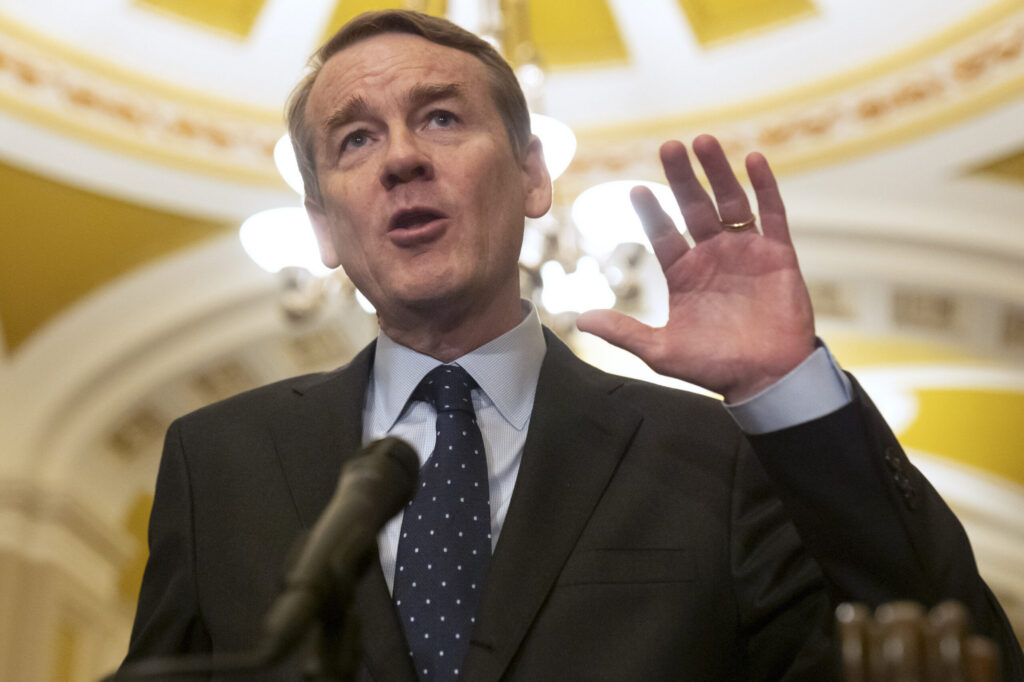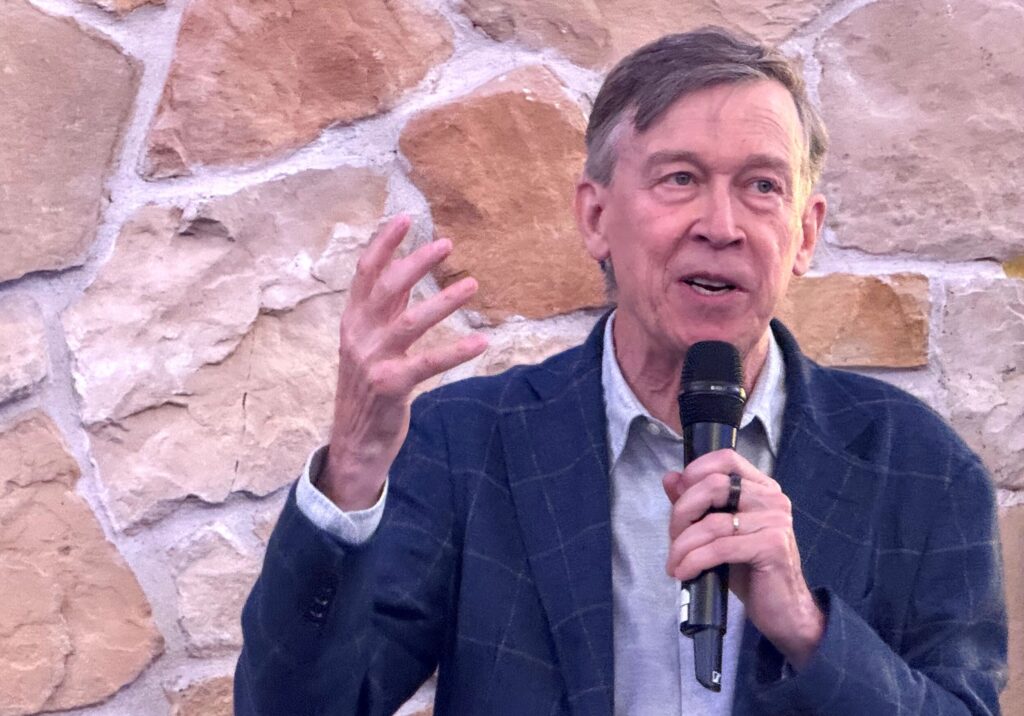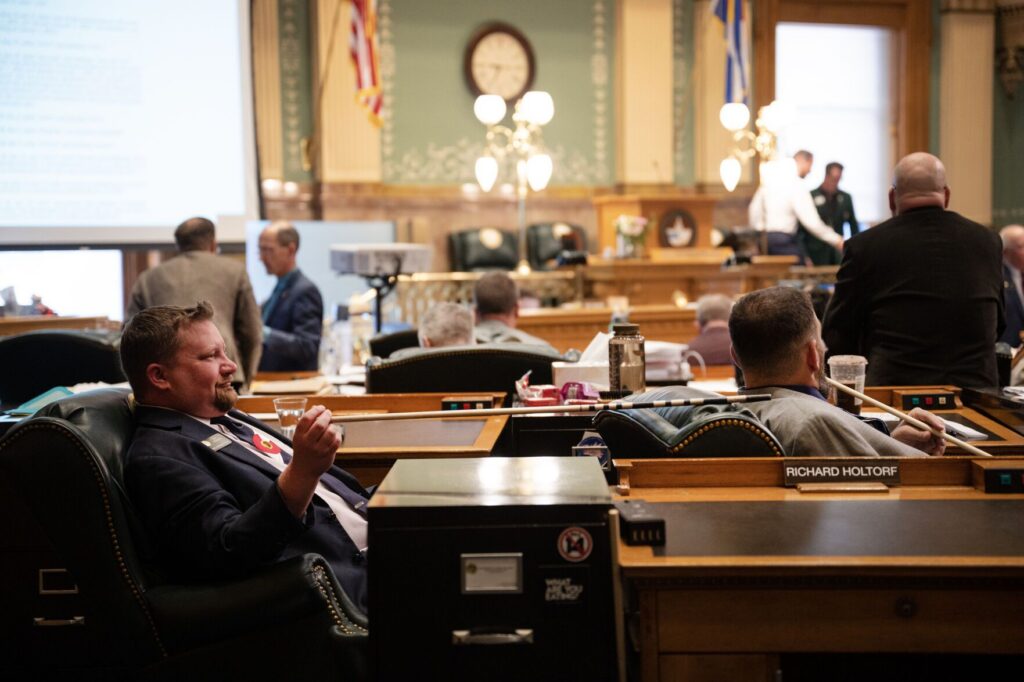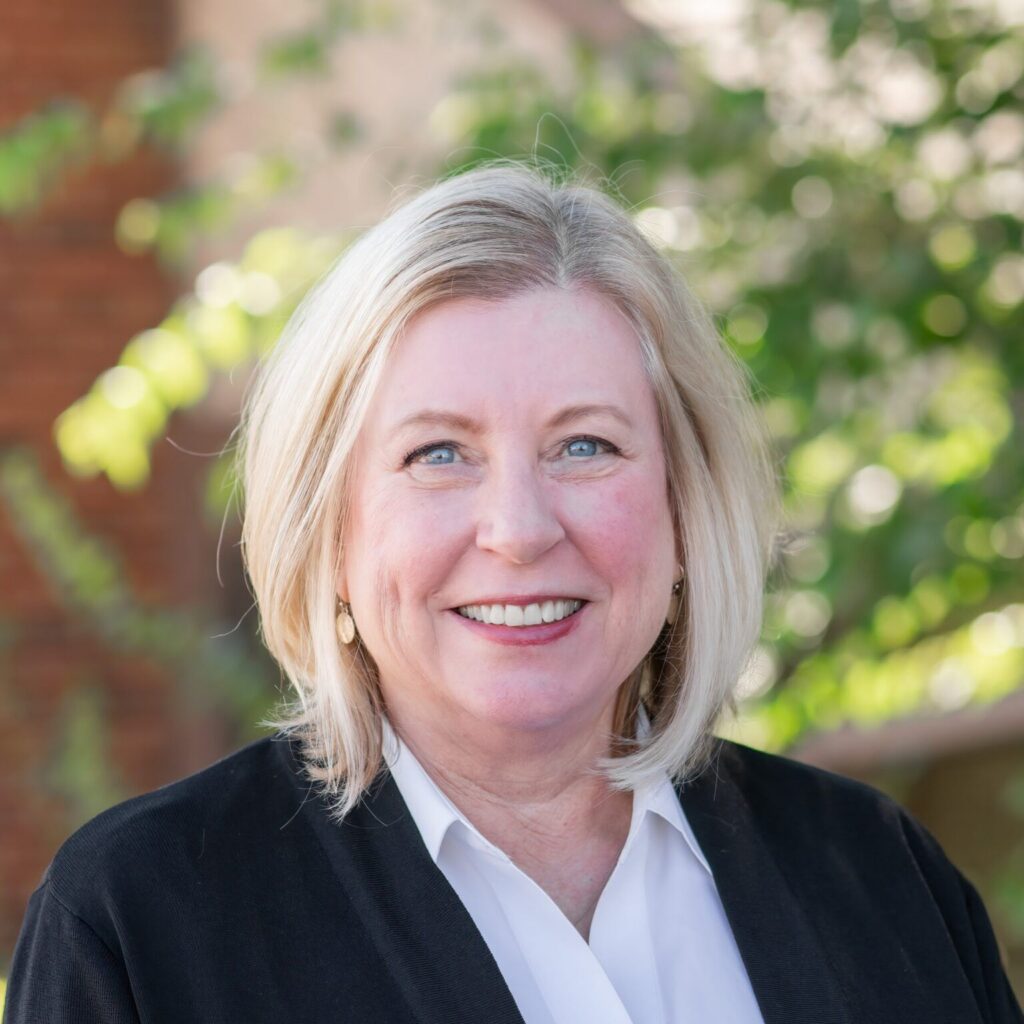‘The Weinstein Effect’: A firestorm over sexual harassment forces changes at Colorado’s Capitol

The New York Times investigation of movie mogul Harvey Weinstein apparently started it – some have dubbed it the Weinstein Effect – but why did his alleged sexual assaults on a number of women in the film industry touch off a national conflagration?
Why not Bill Cosby, Bill O’Reilly, Roger Ailes, or, going back further, Bill Clinton or Gary Hart? Anita Hill’s testimony about Supreme Court Justice Clarence Thomas shook the system some three decades ago, but even then millions held their silence.
In the wake of the Weinstein disclosures, the #MeToo hashtag began trending on social media in October, filling Facebook and Twitter feeds with victims’ stories about sexual abuse, assault, and harassment. Prominent male figures in entertainment, journalism, government and business have been toppled or are teetering.
The ripples reached the Capitol in Denver fairly quickly. Rep. Steve Lebsock, D-Denver, was targeted by NPR-affiliate KUNC with a story alleging nine women had come forward claiming they’d been touched or propositioned by him both at the Capitol and “off campus.”
Rep. Faith Winter, D-Denver, has filed a formal complaint against Lebsock with House Speaker Chrisanta Duran, alleging Lebsock made sexually crude remarks to her at a gathering at a bar at the end of the 2016 legislative session. KUNC’s Bente Birkland also reported that former lobbyist Holly Tarry and former legislative aide Cassie Tanner also accuse Lebsock of behaving inappropriately.
Duran called for Lebsock’s resignation and removed him as chairman of the House Local Government Committee. Since then other Democrats, including Gov. John Hickenlooper and Lt. Gov. Donna Lynne, have pressured him to step down, as well, Lebsock said. He also said he has been unfairly targeted and is himself the subject of harassment and threats.
In quick order, Rep. Paul Rosenthal, D-Denver, was accused of groping a campaign organizer at an LGBTQ event. Colorado State Senators Randy Baumgardner (R-Breckenridge) and Jack Tate (R-Centennial) were accused of sexual harassment, Birkland reports.
All four lawmakers have denied any wrongdoing, and many are wondering if the #MeToo movement hasn’t been weaponized for political gain.
Reviewing harassment policyLegislative leaders, meanwhile, are scrambling to do damage control. The Executive Committee of the Legislative Council announced plans to hire an independent consultant to review the legislature’s existing procedures regarding workplace harassment.
“We have a current reporting system and we have a zero-tolerance policy for such things,” said Senate President Kevin Grantham, “but we’re going to have someone come in and see where the holes are, where we can fill the gaps, review and possibly overhaul the way we do things to make it a better system.”
That review will look at best practices, including record keeping, protections against retribution, online reporting and safeguards to allow patterns of harassment to be detected and handled appropriately.
The Executive Committee includes Grantham, Duran, Senate Majority Leader Chris Holbert, House Majority Leader KC Becker, Senate Minority Leader Lucia Guzman and House Minority Leader Patrick Neville.
Duran said it’s not a partisan issue.
“This is about working together to address what clearly is a problem,” she said. “I am glad that all four caucuses have agreed to set up a comprehensive review of our harassment policies, and I hope that through this process we can create a welcoming and respectful workplace for everyone.”
In an interview with The Denver Post, Duran said she thought a neutral third-party should investigate sexual harassment allegations to “safeguard against any possibility or perception that leadership might make decisions for political reasons.”
Rep. Lois Landgraf, R-Fountain, was, in fact, highly critical of Duran’s handling of the Lebsock case.”The fact that you placed a known harasser with multiple accusations against him in a position of power over us, lobbyists and interns shows an incredible lapse of judgment,” Landgraf wrote in a letter to Duran. “You put us all at great risk.”
Duran responded that she thought the issue had been resolved.
Grabbing and gropingAfter the Weinstein story was published, actress Alyssa Milano used her Twitter account to urge others who had been harassed or assaulted to tweet two simple words – #MeToo. Twitter later confirmed that the hashtag reached half a million within 24 hours, and now is up to 1.7 million spanning 85 countries.”I think social media does have quite a bit to do with it, but look into the research on why victims of sexual abuse and sexual assault don’t come forward,” said Lorraine Bayard de Volo, Women and Gender Studies chair at the University of Colorado. “In a workplace context, women fear for their jobs or how it might impact their career, but also – because of the way women have been raised and expectations of femininity – they don’t want to be seen as troublemakers and they don’t want people to gossip about them. One of the other big aspects of it is that women fear that they won’t be believed.”
Bayard de Volo says social media has had a big impact on overcoming that fear because it allows the information to circulate much more widely and much more rapidly than ever before.
“So it’s able to gain momentum very quickly and I think that’s one of the biggest aspects of the contemporary phenomenon we’re seeing where an unprecedented number of women coming forward,” she said. “It’s about striking down fear that they won’t be believed, or they’re seeing that other people have gone through what they went through.”
Bayard de Volo also thinks the last election cycle may have encouraged more victims to speak up. When a video surfaced of then presidential candidate Donald Trump bragging about grabbing and groping, he and his supporters dismissed it as “locker-room talk.”
“When so many women who’ve experienced so many forms of sexual assault … and even if they didn’t report it, to see that even that wouldn’t tank a presidential campaign, it certainly mobilized a lot of women,” she said. “And I think it mobilized them across some lines that are sometimes harder to cross: Class lines, and racial/ethnic divides too.”
Perhaps the most significant, though, is the cross-generational component of the #MeToo movement.”I think on campuses, there’s some increased interest in the topic, but I think in terms of actual action and a shift in beliefs, that’s not where I’m seeing an amazing change,” Bayard de Volo said. “I’m in my early 50s and I think it’s really more in my generation, middle-aged women and older women speaking out against this, including some really high-profile, famous women.”
She credits pop star Taylor Swift – who won a court battle in Denver after a groping incident – for encouraging middle and high school age girls to speak up and say “no” to unwanted sexual advances. But she says this is the first time she’s seen an older generation get upset, mobilize, and demand attention and change. She calls it nothing short of remarkable.
Crossing the lineEvery two years, Colorado lawmakers and new Capitol staffers are required to attend a class on workplace harassment before the start of session.
Curtis Graves, staff attorney for Rocky Mountain Employers Council, the organization that heads up the training, says four criteria must be met for bad behavior to be classified as workplace harassment, sexual or otherwise:
? The victim has to be in a protected class: race, gender, national origin, religion, age.? The comments or actions have to be unwelcome.? The actions have to be unreasonably offensive. For example, would a reasonable person of the same background have been offended?? And the act must be pervasive or severe. Graves offers the explanation that grabbing someone by the backside would be severe. Telling racially offensive jokes on a regular basis would be pervasive.Graves says meeting those four criteria can sometimes be a cumbersome process.
“We go through defining what sexual harassment is, the protected statuses that differentiate the difference between merely boorish, uncivil behavior versus actual harassment,” Graves said.But, he says the program is designed to force participation.
“We get pretty worked up with gesticulation and making people run around to different parts of the room depending on how offended they are,” he said. “We go through it exhaustively.”
He also said the training can be “as boring as hell – it’s a lot of legaleze that we’re trying to get people to understand. I’m sure despite our best efforts some people never grasp what we’re trying to teach them, but that’s the nature of the beast.”
He’s not surprised by how many women are coming forward, even years after being propositioned, groped, attacked.
“I think it’s pretty consistent with the statistics we read, a huge number of women are harassed and never come forward,” Graves said. Of those who offend, he said, “We do still encounter people who think it’s 1975, and I think there’s more (allegations) to come.”
“It’s just been a long time filtering out; I would like to believe it gets better each year,” he said. “The ‘Me, Too’ movement has really given it a shot in the arm.”
Denials and apologiesRep. Winter told Colorado Politics Lebsock’s apology isn’t good enough, that him saying he’s sorry how he made people feel is not apologizing for his actions.
Alabama Republican U.S. Senate candidate Roy Moore has forcefully denied preying on teenage girls while he was a thirty-something prosecutor.
Donald Trump denies attacking anyone, and dismisses his “grab them by the etc.” comment as “locker room talk.”
Harvey Weinstein said he needs professional help.
Actor Kevin Spacey posted an apology on Twitter, claiming that he didn’t remember the incident and calling it “inappropriate drunken behavior.”
Comic Louis CK admitted – an admission laced with sexually explicit language – that he’d learned his lesson “too late,” and he’d wielded his power over others “irresponsibly.”
How the court of public opinion measures these varied responses remains to be seen, Graves said.
“It’s too soon to say, is Louis CK going to ever work again?” Graves asked. “His response, it isn’t perfect, but it’s the best I’ve seen so far.”
An amazing crescendoColorado College professor Tomi-Ann Roberts said she is a little surprised by the momentum of – and fallout from – the conversation she helped inspire almost two months ago. Roberts’ allegations of sexual harassment and intimidation by Harvey Weinstein were among those that came to light in the October 5 New York Times investigation, sparking #MeToo.
“I never in a million years thought the conversation would reach this amazing crescendo, or that it would stay sustained for so long,” Roberts said in an email. “It just goes to show you how much a part of the fabric of our lives as women this kind of treatment is.”
Roberts’ disturbing, sexually-charged encounter with the movie mogul occurred in 1984, when the professor was a 20-year-old aspiring actress, waiting tables in New York City during summer break from Smith College. Weinstein was one of her regular customers, and after encouraging her to audition for one of his movies and sending her scripts ultimately invited her to meet with him, privately. When Roberts arrived at the designated location, Weinstein was naked in the bathtub; she promptly left.Now a professor of psychology, author and researcher focusing on the psychological consequences of sexual objectification and sexualization of girls and women, Roberts said she’s heartened at the groundswell that has continued to build since the Times investigation.
“We are also seeing very different kinds of responses from these men: some genuinely apologetic and acknowledging their wrongdoing and the harm they caused, but, sadly, most not doing this at all,” she said.
“What I really hope for now is that ordinary women, who’ve been sexually harassed and objectified in ordinary jobs can walk down the hall to HR and be believed, and that HR will step up and give them justice.”
Gazette reporter Stephanie Earls contributed.












